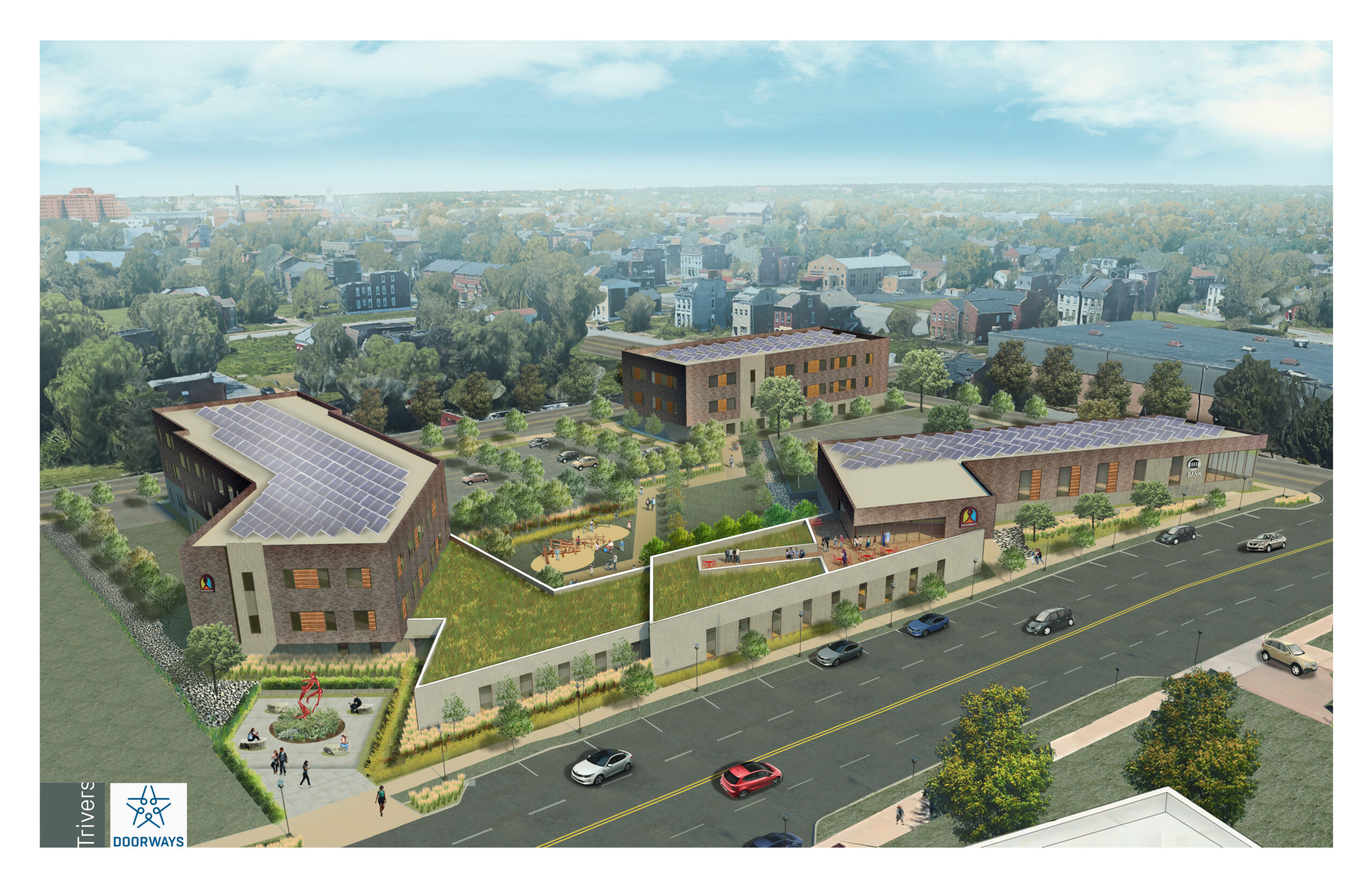Posted May 12, 2023
DOORWAYS, 1101 N. Jefferson Avenue 63106
Construction of Elliott Place Completes
Jefferson Avenue Campus
Fulfilling the plan for 89 new one and two bedroom apartments for
unhoused people challenged with HIV and other conditions associated with poverty.
CLICK HERE TO DOWNLOAD THE
PRESS RELEASE AS A PDF
St. Louis – May 12, 2023 On Thursday, May 18, DOORWAYS will host the groundbreaking ceremony for its 39-unit apartment building, Elliott Place, at the new DOORWAYS campus that opened last year at 1101 N. Jefferson Avenue. Elliott Place will complete the Jefferson Avenue Campus, fulfilling the plan for 89 new one- and two-bedroom apartments as part of the effort to help individuals attain improved health and quality of life while also reducing homelessness and the spread of HIV in St. Louis. The event opens with a 10:00 a.m. reception, 10:30 a.m. program, and 11:00 a.m. groundbreaking.
“There is no reason for HIV to continue at epidemic levels among the poor other than a lack of resources for and commitment to our most vulnerable and invisible neighbors, and it all starts with housing,” stated Opal M. Jones, President and CEO. HIV can be treated. An HIV medication regimen can render the virus untransmittable, stopping new HIV infections and ultimately bringing an end to HIV in future generations.
The DOORWAYS pioneering new model of care uses housing as the delivery system for 360 degrees of services to build the environments that influence progress on the path to opportunity and independence: housing, health, education, income, community, etc. (the social determinants of health (SDOH)). “No one can improve their quality of life and health outcomes while living unsheltered. No one can manage an HIV medication regimen without a place to call home—housing is healthcare,” explained Jones.
When Elliott Place opens in 2024, residents will receive the same assistance as other DOORWAYS clients. Through personalized care coordination, staff will assist clients with scheduling transportation to medical visits and tests as well as appointments with onsite services: emergency food supplies, behavioral health counselors supplemented with 24/7 crisis intervention services, an active employment program that positions clients for careers rather than minimum-wage jobs, self-development programs to fill gaps in knowledge due to a legacy of poverty, pharmacy delivery until the pharmacy opens on the north end of the campus, and more.
“We are grateful to many who helped us launch Phase 2 of this agency expansion,” said Jones. “I particularly want to point out our funders. Thank you to Missouri Housing Development Commission, Department of Housing and Urban Development, St. Louis Affordable Housing Trust Fund, St. Louis Mental Health Board, Midland States Bank, and the Metropolitan Sewer District Project Clear.”
PHOTO OPPORTUNITIES
10:00 a.m. Reception
10:30 a.m. Presentation in the community room, 1101 N. Jefferson Avenue.
Speaking: Opal M. Jones, DOORWAYS President & CEO
Tishaura Jones, Mayor of the City of St. Louis
Rasheen Aldridge, Ward 14 Alderman
Dr. Mati Hlatshwayo Davis, City of St. Louis Director of Health
11:00 a.m. Groundbreaking on the construction site next to parking lot.
STATISTICS
- Statewide, there are 10 homeless people per 10,000 Missourians. That jumps to 30.7 for the City of St. Louis—compared to 4.5 for St. Louis County. https://endhomelessness.org/homelessness-in-america/homelessness-statistics/state-of-homelessness-report/missouri/
- Louis rates for sheltered and unsheltered homeless persons has been on the rise since 2021 (https://cocstl.org/data/).
- Studies on homelessness point to a lack of affordable housing, access to healthcare, and services for mental wellness/drug use. https://www.fox21online.com/2022/05/16/st-louis-county-releases-homelessness-count-2022/
- Black residents of the City of St. Louis are more than four times as likely to be homeless as white residents. https://www.stlouis-mo.gov/government/departments/mayor/initiatives/resilience/equity/opportunity/health-safety/homelessness.cfm
- The rate of HIV among Black persons in the St. Louis HIV Care Region was 5.6 times as high as the rate among whites in the 2019 Epi Profile https://health.mo.gov/data/hivstdaids/pdf/stlouis-hivstd-2019.pdf
- Louis Fast-Track data shows 2021 HIV rates per 100,000 Missourians was 68% higher for Black residents (1,461) versus white residents (869). https://www.stlouis-mo.gov/hiv/data/demographics.cfm
- This disparity continues in with mental health In 2021, African American individuals in St. Louis City received services from psychiatric programs for mental illness at a rate of 40/1,000 population compared to Whites with a rate of 15/1,000. https://www.stlouismo.gov/government/departments/health/behavioral-health/data.cfm
- Additionally, Black males in the City of St. Louis had the highest rates of fatalities related to substance use during 2017-2021. https://www.stlouis-mo.gov/government/departments/health/behavioral-health/data.cfm
ABOUT DOORWAYS
Founded in 1988, DOORWAYS provides housing and 360 degrees of wrap-around services to people at the intersection of poverty, homelessness, and illness from HIV. In fiscal year 2022, we served 3,148 clients and family members in 124 counties spread across Missouri and Illinois. Expanding over the years to meet growing depth and breadth of need, DOORWAYS evolved from a hospice caring for the dying to an agency building lives for the living. We currently offer 7 housing platforms–emergency housing, flexible housing, assistive housing for those too ill to live independently, permanent housing for families with small children, residential housing, plus two subsidy programs that provide temporary rent/utility assistance to avoid homelessness.
Housing is supplemented by empowerment services to cultivate the social determinants of health (housing, health, education, employment/income, community, etc.) that are needed to advance towards a life of opportunity and independence. We use individualized case management, resource referrals, self-development programming, employment support, and behavioral health care. Through this mix of services to stabilize housing, health, and hope, clients begin their journey toward a more self-directed life. Once housed and linked with their care coordinator, clients are encouraged to comply with an HIV-medication regimen that can help them attain undetectable status. When HIV is undetectable, life span and quality of life improve as HIV is rendered untransmittable. Bringing an end to new cases of HIV will ultimately eradicate HIV for future generations.
FOR MORE INFORMATION:
Karen Carpentier314-328-2704 | kcarpentier@doorwayshousing.org
